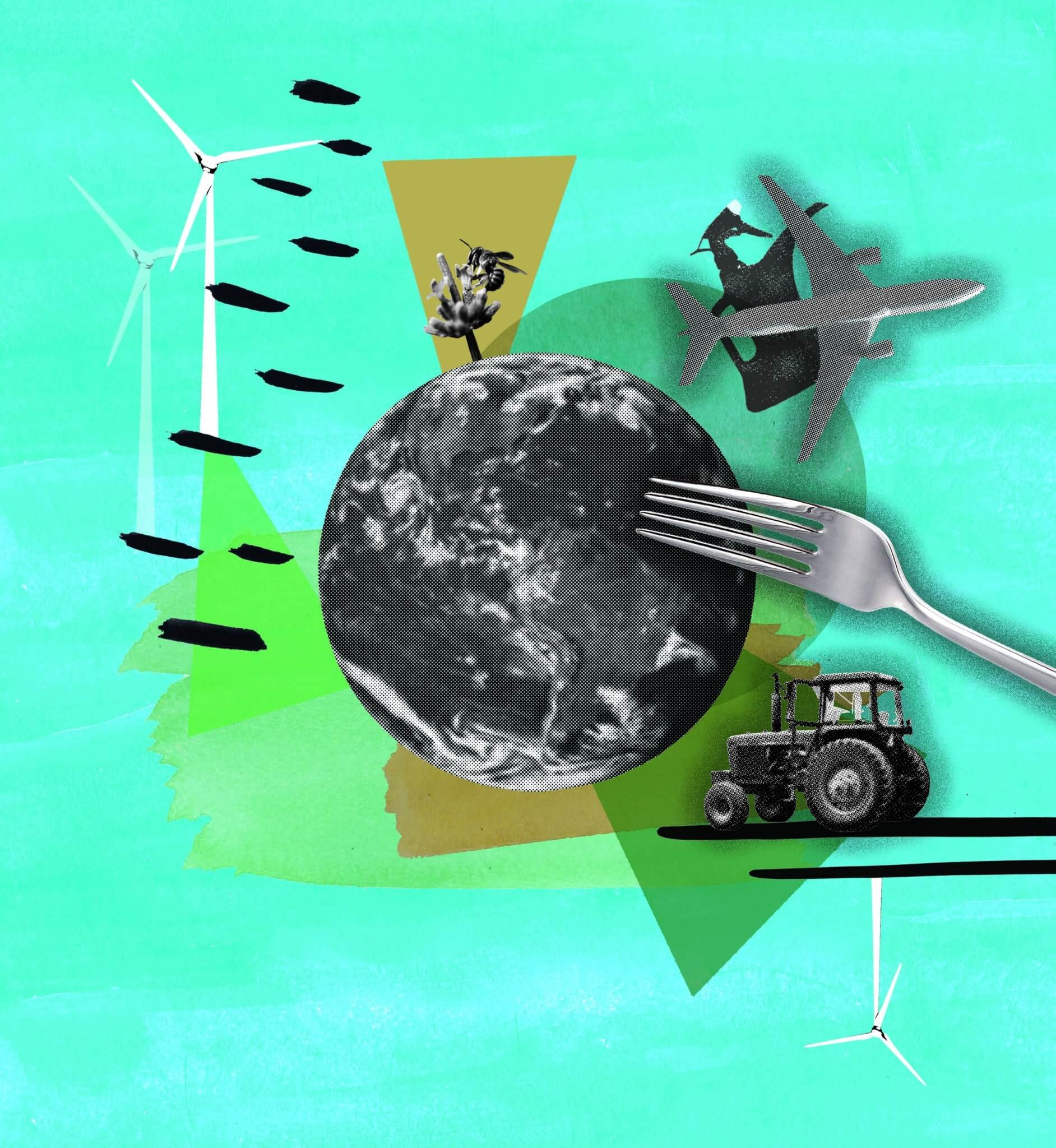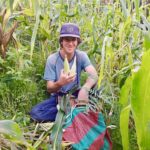Regenerative Thinking is a regular column for Wicked Leeks by Nathan Einbinder, programme lead at Schumacher College, on food, farming and social change.
Earlier this month, on what was then the planet’s warmest day on record, I was in an aeroplane over the Atlantic Ocean, headed to Cancun.
It was a work trip, with less than a day in Mexico before heading to Guatemala, where I do sustainability research with family farmers.
I arrived late and took a cab to a hotel near the beach. It was the cheapest one I could find – with AC. A hot place as is, the entire region was experiencing record temperatures for weeks, with an unusual absence of rain despite it being in the middle of the wet season.
It was after my early morning run, and swim in the Caribbean, that I saw the news about the global record being broken. It felt ironic, sickening even, to be in a place whose very existence depended on our excessive behaviour.
I was out of there quick enough – to Guatemala, which was also in prolonged drought and abnormal heat. The following mornings I’d read about more records falling, and how it was just the beginning of things to come.
I obsess over heatwaves and droughts and melting ice caps; I’m desperately nostalgic for the past, when it rained and snowed where and when it was supposed to.
Truth is, I’m probably the most concerned if not paranoid person I know about climate change. I obsess over heatwaves and droughts and melting ice caps; I’m desperately nostalgic for the past, when it rained and snowed where and when it was supposed to; I have regular nightmares about the future. I’m a nuisance to my family and friends, and increasingly bothered by people who do not care or take notice of the changes we’re experiencing and their role in it.
Yet, I do these trips. Not regularly, but enough. And no matter how environmentally conscious I claim to be, my lifestyle puts me at the top percentage of greenhouse gas emitters in the world. About 50 times more, I reckon, than the people I work with in Guatemala.
I know I’m not alone in wanting to change my habits, if only to feel less guilty and hypocritical, and embody the kind of low or zero impact lifestyle I feel we should all adopt.
But how? And more importantly, why?
I know I’m not alone in wanting to change my habits, if only to feel less guilty and hypocritical, and embody the kind of low or zero impact lifestyle I feel we should all adopt.
Why, when everything we hear is that individual change is mostly pointless? The problem is too big, we’re told, with too many people involved. The only real way to stop the mess we’re in is to reign in the evil powers that be; the oil companies and complacent governments. That and develop a whole bunch of new technologies.
True as it may be, the narrative is incredibly disempowering – and effective at keeping us slaves to the very companies and life-destroying activities we so desperately want to undo.
As we watch the world go up in flames, we continue our lives passively waiting for change to happen way up high, somewhere untouchable.
But how empowering would it be – and how much positive change could happen – if we were to believe our actions mattered? If one by one, thousands of people, millions even, took steps in the right direction, supporting one another, changing the culture from one of blame and helplessness to action. And making a serious dent in the climate crisis at the same time.
Perhaps it sounds unreal, like a fantasy. But it’s not as if this kind of snowball hasn’t happened before. Consider the farmers I work with, many of whom are transitioning from decades of poor management and chemical dependency to agroecology. Starting with a few outliers, it’s grown into a movement of hundreds of families driven by crisis, inspired by their neighbours and charismatic leaders, and by being part of something larger than themselves. And in doing so, they aspire to drive the agrochemical dealers out of business and restore a once battered landscape.
This is precisely what we need in the citizen movement to reverse the climate crisis. I’m not saying we shouldn’t force our governments to act, nor disregard new technologies and attempt to overturn the oil companies. But to maintain any hope in the meantime, we need to use every tool we can. Being part of the solution and owning up to our habits will only help – possibly in ways we could never imagine.










You don’t say whether you’re going to stop flying Nathan? It would be interesting to hear what you decide.
Surely if all the people who fly recreationally (ie on holiday) stopped then some flights for humanitarian reasons would not be such a huge problem – people carrying out vital work and supplies being flown into disaster areas. How could the good that Nathan is doing be achieved without flying. I lived in northern Canada for many years and can not see how the isolated “fly in” communities could cope without the medical services , without their kids going out to high school etc. all done by plane. I know quite a few people, including myself who have stopped flying on holiday – I go by train from Poland to the UK – more costly in time and money so I don’t go as often as I used to and many of my friends now holiday closer to home and are discovering how relaxing and fun that can be.
This brings to mind the quote from Margaret Mead – that quite often comes to mind –
“Never doubt that a small group of thoughtful, committed citizens can change the world; indeed, it’s the only thing that ever has.”
It seems Margaret Mead spoke a lot of wisdom, in her quotes, such as – “Children must be taught how to think, not what to think.”
“Never depend upon institutions or government to solve any problem. All social movements are founded by, guided by, motivated and seen through by the passion of individuals.”
“For the human species to evolve, the conversation must deepen.”
“Be who you really are, do what you want to do, in order to have what you really want.”
“The most intractable problem today is not pollution or technology or war; but the lack of belief that the future is very much in the hands of the individual.”
“We are living beyond our means. As a people we have developed a life-style that is draining the earth of its priceless and irreplaceable resources without regard for the future of our children and people all around the world.” (She said that back in the 70’s, as far as I’m aware)!
Lastly, but amongst many others, “As the traveller who has once been from home is wiser than he who has never left his own doorstep, so a knowledge of one other culture should sharpen our ability to scrutinize more steadily, to appreciate more lovingly, our own.”
A little known fact it seems, is that “Fossil fuel-derived pesticides are a significant but overlooked source of greenhouse gases, warn campaigners. Use of pesticides, which includes insecticides, herbicides and fungicides, increased by 16.7% across the world between 2005 and 2020, according to Pesticide Action Network UK (PAN UK).
https://sustainablepulse.com/2023/07/14/pesticides-and-climate-change-is-a-vicious-cycle-pan-uk-report/
Also, another overlooked source of pollution – “Rarely does mention of the pharmaceutical industry conjure up images of smoke stacks, pollution and environmental damage.
Yet our recent study found the global pharmaceutical industry is not only a significant contributor to global warming, but it is also dirtier than the global automotive production sector.”
https://www.notonthebeeb.co.uk/post/big-pharma-emits-more-greenhouse-gases-than-the-automotive-industry?cid=dedee0b8-d9d6-44b2-ac4a-46ea86a0349c
Hello Nathan. I’ve just read your article and I appreciate and respect the work you’re doing to address the climate issues. I’m wondering if you’ve heard of Dane Wigginton? I came across him and the website http://www.geoengineeringWatch.org recently and what I discovered is shocking and enlightening in equal measures. I’ve found it revealing and increasingly important (given the state of our world) to consider other sources of information. I thought you may also find it interesting. All the very best, Charlotte
Also very interesting, from Cellular Phone Task Force – Sea Bird’s Last Refuges – https://cellphonetaskforce.org/sea-birds-last-refuges/
Project Drawdown cites air conditioning as the biggest single threat (refridgerants), so avoiding that and air source heat pumps would be a start i suppose, even if the air travel is necessary.
Buying local food and minimising newly manufactured items seem sensible and do-able.
Well said. As a privileged urban permaculture designer living in an affluent Canadian City in Canada, I so relate to your mindset and frustrations, and also to your description of self (obsessive, nuisance, etc). The following text in particular seems to apply to most of North America at this place in time. “It felt ironic, sickening even, to be in a place whose very existence depended on our excessive behaviour” The economies of the developed and developing world in fact, seem to be tied to excess in all things. I too believe that grassroots change is what is needed — head down forward movement by the masses — and might just save us. Thank you for sharing.
The very wonderful founder of your workplace at Schumacher, Satish Kumar, in his delightful ORFC (Oxford Real Farming Conference) monthly meditations is a great proponent that we should all be activists no matter how small our action may seem as only through action is there change. The ripples we create can fan out and be more influential than we imagine.
I can’t say I completely understand the total nature of your work Nathan but it sounds like it’s doing a lot of good. Helping farmers to shake off the shackles they are burdened with from big corporations and work their land in a more beneficial way is good. The fact that you have to fly to do this could cause some to call you a hypocrite. But that applies to all of us if someone were to scrutinise our lives closely. Perhaps it may help if I am in the position to never fly and you use my allocation? I know the problem is ‘bigger than all of us’ but I still try to ‘do my bit’ This includes not eating anything animal, which I started doing for health reasons then saw the environmental reasons then the hurting animals reason. I can’t see any reason to eat animal products. We feed billions of animals, land and sea whilst people starve for lack of food, is that just?
This brings to mind the quote from Margaret Mead –
“Never doubt that a small group of thoughtful, committed citizens can change the world; indeed, it’s the only thing that ever has.”
It seems Margaret Mead spoke a lot of wisdom, in her quotes, such as – “Children must be taught how to think, not what to think.”
A little known fact it seems is that “Fossil fuel-derived pesticides are a significant but overlooked source of greenhouse gases, warn campaigners.” Use of pesticides, which includes insecticides, herbicides and fungicides, increased by 16.7% across the world between 2005 and 2020, according to Pesticide Action Network UK (PAN UK).
https://sustainablepulse.com/2023/07/14/pesticides-and-climate-change-is-a-vicious-cycle-pan-uk-report/
Also, another overlooked source of pollution – “Rarely does mention of the pharmaceutical industry conjure up images of smoke stacks, pollution and environmental damage.
Yet our recent study found the global pharmaceutical industry is not only a significant contributor to global warming, but it is also dirtier than the global automotive production sector.”
https://www.notonthebeeb.co.uk/post/big-pharma-emits-more-greenhouse-gases-than-the-automotive-industry?cid=dedee0b8-d9d6-44b2-ac4a-46ea86a0349c